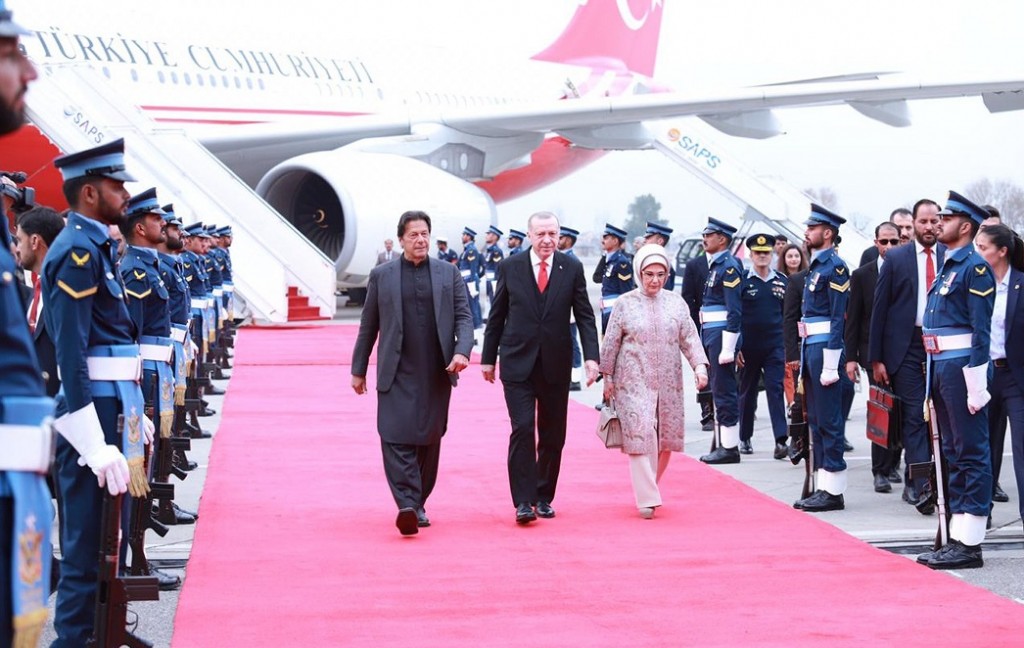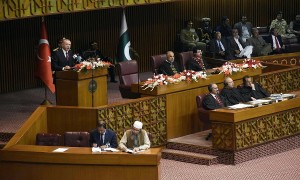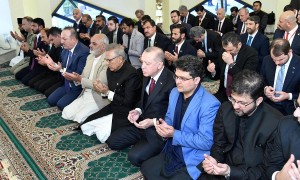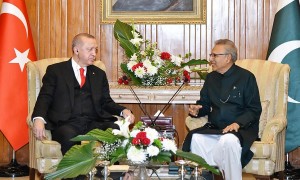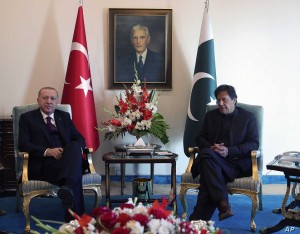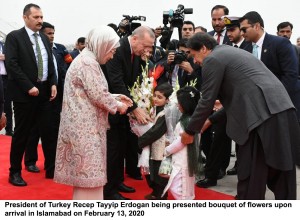President Erdoğan’s Visit to Pakistan
Long Live Pakistan-Turkey Brotherhood!
On 13th of February, President of Turkey, Recep Tayyip Erdogan, reached Islamabad on a two-day visit to attend the sixth meeting of the High-Level Strategic Cooperation Council. The visit came at a testing time for both countries and it, indeed, speaks to the durable nature of the relationship. Although Turkey and Pakistan have always had a particularly close relationship, Erdogan’s sparked a different kind of excitement among Pakistanis as the nation considers him a great leader of the Muslim Ummah and also follows his statements and actions very closely. This visit was not an ordinary one, as is evident from the fact that he was accompanied by members of his cabinet, senior government officials and top business figures. That President Erdogan did take up a visit to Pakistan despite Prime Minister Imran Khan failing to keep his commitment to attend the December 2019 Kuala Lumpur Summit—pretty understandably on the wishes of its other ‘friendly’ countries in the region—shows that the Pak-Turk relationship is beginning to grow into a serious engagement, and cannot be deterred by a diplomatic hiccup or two.
Turkish President Recep Tayyip Erdoğan reached Islamabad on February 13 on a two-day official visit, becoming the first foreign head of a state to visit Pakistan in 2020. This special visit saw the president joined by a high-profile delegation. The two countries also signed a number of bilateral agreements and memoranda of understanding (MoU) to boost cooperation in various fields. Both countries signed 13 MoUs. Ranging from tourism to security, the MoUs also include the cooperation between Pakistan state-owned PTV, Radio Pakistan and Turkey’s state broadcaster Turkish Radio and Television (TRT).
Address to the parliament
Addressing a joint session of the Pakistani parliament for a record fourth time, the Turkish president minced no words vowing to support Pakistan on Kashmir and FATF as well as on its fight against terrorism, hunger and poverty. After speaking at length on the historic relations between Pakistan and Turkey, the visiting president spoke his heart out on Kashmir issue. He pointed out how the Muslims of the Subcontinent had backed Turkey during the Gallipoli campaign, also known as the Battle of Canakkale, in 1915 during World War I, pointing out a rally held in Lahore led by Allama Iqbal. He also pledged to continue his unflinching support for Islamabad’s stance on Kashmir, comparing it to Turkey’s own historic 1915 Gallipoli campaign and going as far as saying that the plight of the people of the Indian-occupied territory meant as much to his country as it did to Pakistan as the two countries signed a string of pacts to strengthen ties in various fields. He likened the Kashmir freedom struggle to the Khilafat Movement and said the feelings of Turkish people for Kashmir were the same as those of the Muslims of the Subcontinent had for the Khilafat Movement.
Quoting a poem by Iqbal, which he said the great poet had read out loud at the Lahore rally, the Turkish president said: Like the poet of Lahore [Iqbal], the people [at the rally] were drowning in these emotions. The people of Pakistan have always stood shoulder to shoulder with the people of Turkey.”
Elaborating on the incident, Erdogan said while Turkish soldiers were defending the Dardanelles Strait with a glorious resistance in 1915, a rally took place in Lahore 6,000 kilometres from the front and it was “recorded on the unforgettable pages of history”.
“The theme of this historical rally in Lahore Square was Canakkale. On that day, Lahore Square was jam-packed with Muslims as we were struggling to survive and our brothers and sisters here [Subcontinent] were also under pressure of the colonialists. Despite challenges and threats, they raised a huge charity for Canakkale through the exhibitions in the square.”
The dynamics of Pak-Turkey Relations
Historically speaking, the bonds of Pak-Turkey ties are rooted in firm and entrenched friendship at the official and people-to-people levels. Both Pakistan and Turkey, along with Iran, were the original members of Regional Cooperation for Development (RCD) established in 1964 which later on transformed into the Economic Cooperation Organization (ECO) in 1985. Turkey stood with Pakistan in times of need, particularly during the 1965 and 1971 Indo-Pak wars, and Islamabad has always rendered Ankara meaningful support on the Cyprus issue.
Pak-Turkey relations in contemporary era can be analysed from economic, trade, political and security perspectives.
During his visit to Ankara in January 2019, Prime Minister of Pakistan, Imran Khan, in his meeting with Turkish investors and businessmen, expressed satisfaction over growing Turkish investments in Pakistan; stressed the need for transforming the brotherly bilateral ties into a vibrant economic partnership; and assured that his government would provide all facilities in this regard.
Around 20 leading Turkish investors and businessmen, who have ongoing projects in Pakistan, participated in the first meeting organised by the Turkey-Pakistan Business Council of the Foreign Economic Relations Board of Turkey (DEIK).
Furthermore, during his visit, Prime Minister Imran Khan and Turkish President Erdogan discussed measures to boost economic ties between the two countries.
In an article entitled, “Turkish-Pakistani relations: A burgeoning alliance?” by Philip Kowalski and published by the Middle East Institute, Washington DC, on May 22, 2019, the author maintained that, “By 2017, Turkish investment in Pakistan surpassed $1 billion, and Turkey has continued to pursue projects there, such as the export of its Metro Bus rapid transit system. A proposed free trade agreement (FTA) between the two countries, still in the works, projects that bilateral trade will increase from $900 million to $10 billion by 2022.
Pakistan and Turkey also helped each other in times of natural disasters. The scope of promoting Pak-Turkey trade, commercial ties along with tourism will certainly be a major area of discussion during the visit of Turkish President to Pakistan.
Political relations between Pakistan and Turkey are on a strong footing. Pakistan supported the regime of Tayyip Erdogan when in 2016 there was an attempted coup to dislodge his government, and during the subsequent phase.
Turkey has wholeheartedly supported Pakistan’s stance when India annulled special status of its occupied territory of Jammu & Kashmir.
Pak-Turkey defence relations are deep rooted. For instance, in 2009, the High Level Cooperation Council was established between the countries and then upgraded to High Level Strategic Cooperation Council. Several meetings of the Council were held, and more than 60 agreements and documents have been signed so far within this mechanism. Another deal, worth $80 million, was signed between Pakistan’s government and a Turkish contractor in 2013 for the construction of a tanker for Pakistani Navy.
In 2015, Turkey and Pakistan also agreed to cooperate in development and production of tactical unmanned aerial vehicles. In 2016, TAI agreed to modernise the Pakistan Air Force’s fleet of F-16s at a cost of $75 million.
Turkey is one of the key participants in Pakistan’s International Defence Exhibition and Seminar (IDEAS) held in Karachi and companies from both sides always show interest in each other’s products.
The current visit of Turkish President Recep Tayyip Erdogan to Pakistan provided a valuable opportunity for the two countries to examine and revitalise their age-old friendship and their role in regional and international affairs for peace.
Lesson from Turkish Economic Miracle
In the Muslim world, rarely has a country transformed economically and politically in such a short time to pose competition to the European countries. There are a lot of debates on Erdogan’s style of governance as there were on the authoritarian styles of Lee Kuan Yew and Mahathir Mohammad who ruled their countries for decades. The fact of the matter is that what they achieved is no mean accomplishment. What we as a country need is to look at its positive side and emulate those areas where we are facing challenges that Turkey faced decades ago. The two areas where Pakistan needs to focus is economic and human development. Let us look at what Turkey did and what Pakistan can do to accelerate development in the country.
Pakistan’s present government is facing the dilemma of the debt trap that has been accumulated to $100 billion by successive governments. Turkey had similar issues but on a smaller scale as the population and size of the countries differ. Since 1961, Turkey had taken 19 IMF loans, Pakistan has taken about 18. Erdogan inherited an IMF debt of $23.5 billion in 2003, which was reduced to $0.9 billion in 2012. During Erdogan’s leadership, inflation fell from 32% to 9.0% in 2006. Since then, Turkish inflation has continued to fluctuate around 9% and is still one of the highest inflation rates in region. The Turkish public debt as a percentage of annual GDP declined from 74% in 2002 to 39% in 2009. Thus the lessons to learn is that economy and debt are manageable and will take from three to nine years if persistent reforms are made.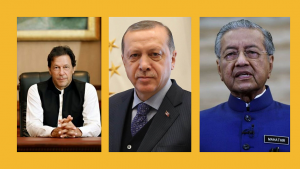
Human development became a priority for Turkey from the first day. Erdogan increased the budget of the Ministry of Education in 9 years from 7.5 billion lira in 2002 to 34 billion lira in 2011, the highest share of the national budget given to one ministry which became higher than military allocations. Compulsory education was increased from eight years to twelve. In 2003, the Turkish government, together with UNICEF, started a campaign called “Come on girls, let’s go to school.” The goal of this campaign was to close the gender-gap in primary school enrollment through the provision of a quality basic education for all girls, especially in southeast Turkey. For Pakistan, the challenge is not just budget and gender gap but quality gap. Public and madressah schools have produced mushrooms of unfit, left behind school kids and graduates who struggle to get jobs or compete with the private school education elites. The government needs to focus for the next five years on levelling the standard of education in the public and private education.
After assuming power in 2003, Erdogan’s government initiated a comprehensive reform programme of the Turkish healthcare system, called the Health Transformation Programme (HTP), to enhance the quality of healthcare and protect all citizens from financial risks. As part of the reforms, the “Green Card” programme, which provides health benefits to the poor, was expanded in 2004. The reform programme aimed at increasing the ratio of private to state-run healthcare, which, along with long queues in state-run hospitals, resulted in the rise of private medical care in Turkey, forcing state-run hospitals to compete by raising quality. Pakistan has introduced Sehat Insaf Card to the poor primarily. This card when first introduced in KP during the 2013-2018 term was very successful in providing quality healthcare to the people below poverty line and then to the rest of the population. However, this facility alone will not improve public hospital conditions. Tough reforms like the MTI act (medical teaching institution) needs to be passed to create accountability of health care professionals in public hospitals.
If Pakistan needs to learn from the Turkish model it must focus on the following:
- Generate more revenues to invest in social and economic development: The economy is already reeling under inflation and more taxes on common man will not solve the problem. Similarly, more debt will just create more dependence. What Turkey did was to sell off its state enterprises to create fiscal space. Pakistan has a list of companies it needs to privatise. This process needs to be expedited to firstly stop putting scarce budget money into bleeding organizations and secondly by selling them to generate the much needed revenue.
- Boosting SMEs: Turkey made sure that a lot of incentives were given to the small and medium enterprises to boost business and job creation. 80% of businesses in Pakistan are SMEs. Kamyab Jawaan Program should ensure not just doling out loans but enterprise capacity building to enable the small and medium businesses to sustain and grow.
- Increase traveller traffic: Like Dubai, Turkey has created reasons for people to visit Turkey. By developing Turkish Airlines as the largest network, Turkey has competed with Dubai for traveller traffic. PIA may not be anywhere near such extensive growth but the principle of getting more people to visit stands true. Tourism in Pakistan is already picking up. More ease of travelling facilities by removing unnecessary paperwork and security checks will make the country more accessible.
Not all that has happened in Turkey is worthy of emulation and there are lessons in that as well. What is worth noticing is that in a period between 2002 and 2011, Turkey turned around from being a struggling country to a case study of development in the Muslim world. The other lesson is that any growth that is debt-based will be short term as has been witnessed in the last ten years in Pakistan. Growth based on pruning of bleeding enterprises and promotion of small and medium enterprises is where the secret of sustainable development lies.
 Jahangir's World Times First Comprehensive Magazine for students/teachers of competitive exams and general readers as well.
Jahangir's World Times First Comprehensive Magazine for students/teachers of competitive exams and general readers as well.
